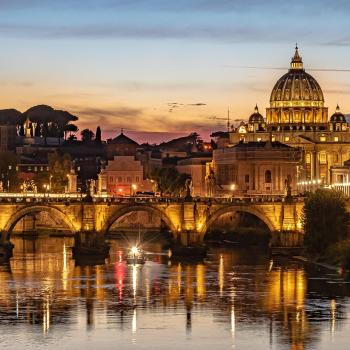 Matthew Soerens is an immigration and citizenship counselor for World Relief Dupage, and co-author with Jenny Hwang of Welcoming the Stranger: Justice, Compassion and Truth in the Immigration Debate.
Matthew Soerens is an immigration and citizenship counselor for World Relief Dupage, and co-author with Jenny Hwang of Welcoming the Stranger: Justice, Compassion and Truth in the Immigration Debate.
Scripture is at the center of why I and so many American evangelicals have become vocal advocates of immigration reform. The Hebrew ger, which most versions of the Bible translate as "alien," appears 92 times in the Old Testament. The words of Exodus 12:49 are repeated several times throughout the Pentateuch: "The same law applies to the native-born and the alien living among you." God speaks repeatedly of His special concern for aliens, who are linked with other vulnerable groups such as orphans and widows (Ps. 146:9; Dt. 10:18; Ezek. 22:7; Zech. 7:10). God loves the alien, and commands His people to do the same, remembering their own history (Lev. 19:33-34). That love goes beyond a general sentiment to legislation, which God included in the Law He gave to the Israelites, mandating rules for the harvesting and gleaning of crops and for tithing that were intended to provide for the needs of immigrants (Dt. 14:28-29, 24:19-21).
While the scriptural mandate to care for the immigrant is clear, many Christians wrestle with what to do with those immigrants who have overstayed a visa or entered the country illegally. Romans 13 makes clear that God has established governing authorities and we are called to submit to them.
Fortunately, there are commonsense solutions that both honor the law and welcome the stranger. Comprehensive Immigration Reform includes many elements, including reducing backlogs to family reunification, increasing border security, establishing new mechanisms for lawful entry, and an earned legalization process for many in the country unlawfully. Earned legalization is probably the most controversial: this means neither amnesty nor open borders, but nor does it mean the other extreme of deporting the estimated 11 million individuals currently in the U.S. illegally. To do so would be a fiscal and economic nightmare, and would separate millions of United States citizens from their undocumented spouses, children, and parents. As Christians who believe that God designed the unified family as the fundamental building block of society (Gen. 2:23-24), we should strive to keep families together.
That's not to condone the fact that some of these immigrants have overstayed a visa or entered the United States illegally. By finding a penalty -- such as a monetary fine and a requirement to get to the back of the line for permanent legal status -- that avoids deportation and family separation for those immigrants without serious criminal offenses, we can uphold the importance of the law and keep families together, applying both justice and mercy.
 Miguel de la Torreis professor of social ethics at Iliff School of Theology and author of Trails of Hope and Terror: Testimonies on Immigration.
Miguel de la Torreis professor of social ethics at Iliff School of Theology and author of Trails of Hope and Terror: Testimonies on Immigration.
Let us begin by pointing out that the way in which the questions are formulated betrays Eurocentric biases. The usage of the term "illegal" is not a neutral word; it connotes criminality -- that those who are illegal are somehow inherently bad, if not evil. But do we call a driver who is driving without a license an illegal driver? Or do we call a taxpayer who fails to file his documents in time an illegal citizen? Of course not. Not having proper documentations, either as a driver or filing one's taxes, does not make the person a criminal. The reason migrants without proper documentation are called illegal has nothing to do with their character, or their moral framework; they are illegal because those in power have the legislative authority to impose their definitions on society. This is nothing new. We have a history where the biases of past Americans in positions of power made their worldview the legitimate norm. For most of this nation's history, it was illegal for blacks to experience the freedoms of whites. It was illegal for women to vote. When such laws restrict humans from participating in their full humanity, it is not the individual who is illegal; it is the prevailing laws that rob a certain group of people of their dignity that are illegal.
Christians have a moral obligation to disobey such illegal laws. Immoral laws are usually ignored, not out of disrespect for the rule of law, but because the lack of justice erodes compliance. When the people continuously disregard the law, it indicates a lack of consent; and without the consent of the public, law ceases to hold society together. For this reason, Christians realize that justice and equality toward the least always trumps any laws of nations that disenfranchise portions of the community. Whenever immoral laws are in place, a moral obligation exists to be illegal.
The question that should have been asked is why are "they" here, and why do "they" keep coming. For some, "they" come here to take away our jobs and use up our social services. For others, "they" come in search of the American Dream, hoping to find a better life for themselves and their families. These are the two most common answers given when asked why "they" cross the border -- ignoring that it was the borders that crossed Hispanics with the conclusion of the Mexican-American War. Nevertheless, the real reason "they" keep coming is bananas. Yes, bananas. And our refusal honestly to deal with the role of bananas contributes to much of the misinformation surrounding the current immigration debate. Before 1870, most Americans had never heard of bananas. By 1899 Americans were consuming over 16 million bunches a year. In that same year, the Boston Fruit Company merged with United Fruit to create the notorious United Fruit Company, the largest banana company in the world, with plantations throughout Central America, South America, and the Caribbean.
Around this time, President Teddy Roosevelt began talking about a "gun boat diplomacy" and "speaking softly but carrying a big stick." We may remember these sayings from grade school, but few understand their impact on the histories of Central and South America. Teddy was describing how the full force of the U.S. military was at the disposal of U.S. corporations, such as the United Fruit Company, to protect their interest....
[See the full response here.]
For over a century the U.S. military provided and protected the freedom for U.S. corporations to build roads into developing countries throughout Latin America to extract, by brute force if necessary, their natural resources and cheap labor. Some of the inhabitants of those countries, deprived of a livelihood, took those same roads, following the resources that were taken from them. They come following what has been stolen. They come to escape the violence and terrorism unleashed in order to confiscate their resources and cheap labor. This changes the questions usually asked about the undocumented. The real question we are faced with is not whether they should come or stay, but, ethically and morally, what responsibilities and obligations exist for the U.S. in causing the present immigration dilemma.
Also see a Mainline Protestant perspective at Holy Hospitality: Seeing Christ in the Immigrant
For similar articles, please see Patheos' Evangelical Portal.




